AI agents are software programs based on artificial intelligence. This is an umbrella term for different AI-powered tools that automate tasks in digital solutions, production environments, and everyday tasks.
Intelligent agents can perform actions and solve problems. These capabilities make them valuable in many industries. Thanks to process automation and learning over time, AI agents save costs, help speed up processes, and make them accurate and secure.
This article is a short guide that will help you understand AI agents, how they work, and their benefits. Read on to learn more about this helpful technology that you can introduce into your business operations.
What are AI agents?
AI agent definition
Basically, an AI agent is software that performs tasks on behalf of a user or a system. Such AI entities use artificial intelligence and operate independently. What makes AI agents different from traditional software is that they can learn from their environments. AI agents can be as simple as chatbots and as complex as systems for autonomous driving.
Explanation of AI agents and their core characteristics
Compared to traditional software, AI agents have advanced characteristics. They are autonomous, adaptable, and able to learn. Autonomy means that they can act on their own to achieve the set goals. AI agents do not need human intervention for that. If an AI agent notices changes in the environment or gets new inputs, its actions will change accordingly. Finally, AI agents can learn from past experiences and results, improving themselves over time.
For example, AI agents can collect and process information, such as sensor data or user interactions. Thanks to the above abilities and reasoning capability, AI agents solve simple to complex problems. Moreover, they can navigate complex scenarios if trained and programmed accordingly.
You may also like: How Do You Create an AI System from Scratch?
How AI agents differ from traditional software programs
The main difference between these technologies is the principle of their operation. Traditional software programs are based on a set of instructions. Such sets are created for every possible scenario of software usage. The approach limits the traditional software’s behavior in new or unforeseen circumstances.
In contrast, AI agents use algorithms to adapt and learn. The algorithms allow AI to make decisions based on data rather than preset rules. So, if the data changes, the AI agent modifies its actions.
This characteristic broadens the range of capabilities and helps AI agents improve over time. Moreover, AI agents can interact with the environment in real time based on current feedback and adjust behavior as a result.
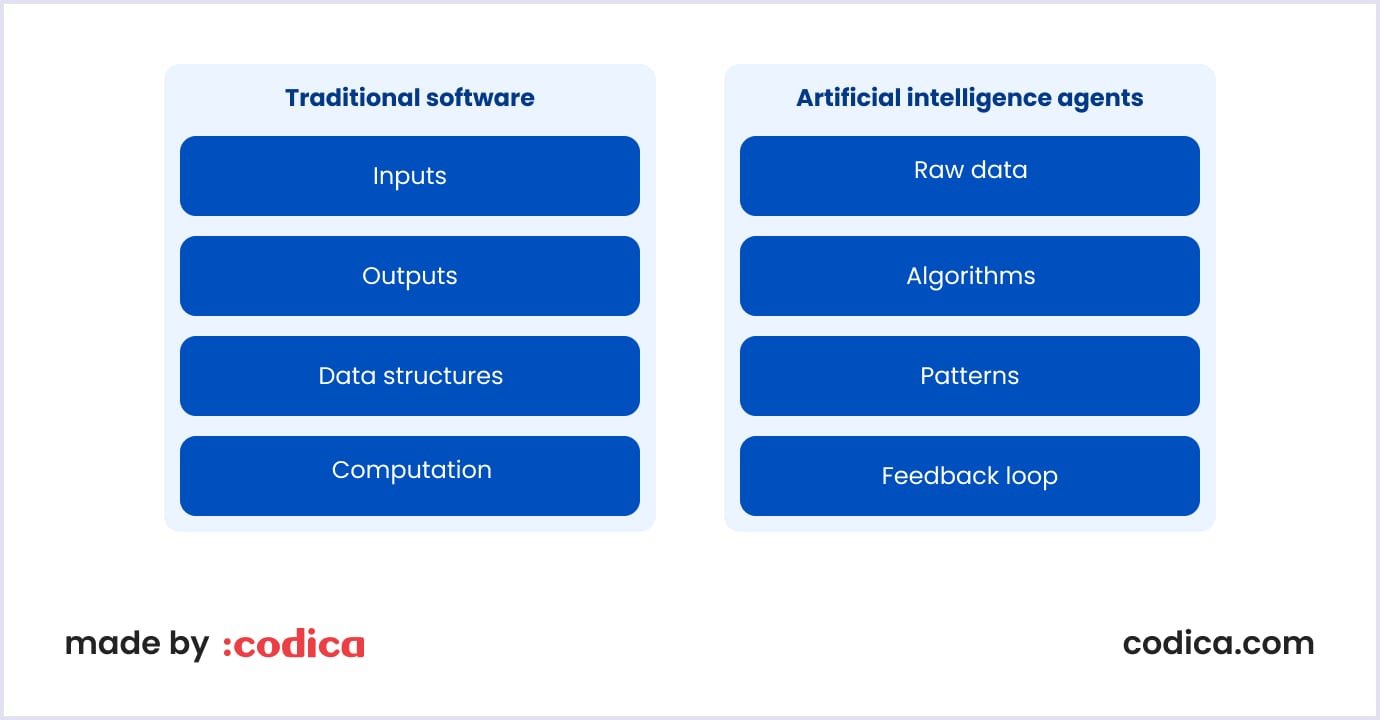
Key milestones in the evolution of AI agents
Though we have witnessed AI's breakthrough in recent years, the development of such solutions started much earlier. Expert systems appeared as early as the 1970s-1980s. These solutions could mimic decision-making in specific domains. For example, DENDRAL could hypothesize the molecular structure of organic compounds, thus helping chemists in their work.
Another example is MYCIN, which was developed based on the experience with DENDRAL and designed at Stanford University in the 1970s. The expert system could analyze multiple factors and suggest antibiotics to treat bacterial infections. Despite its helpfulness, hardware limitations of the 1970s prevented it from being used in actual clinical settings. Nevertheless, this system became a significant event in AI agent development.
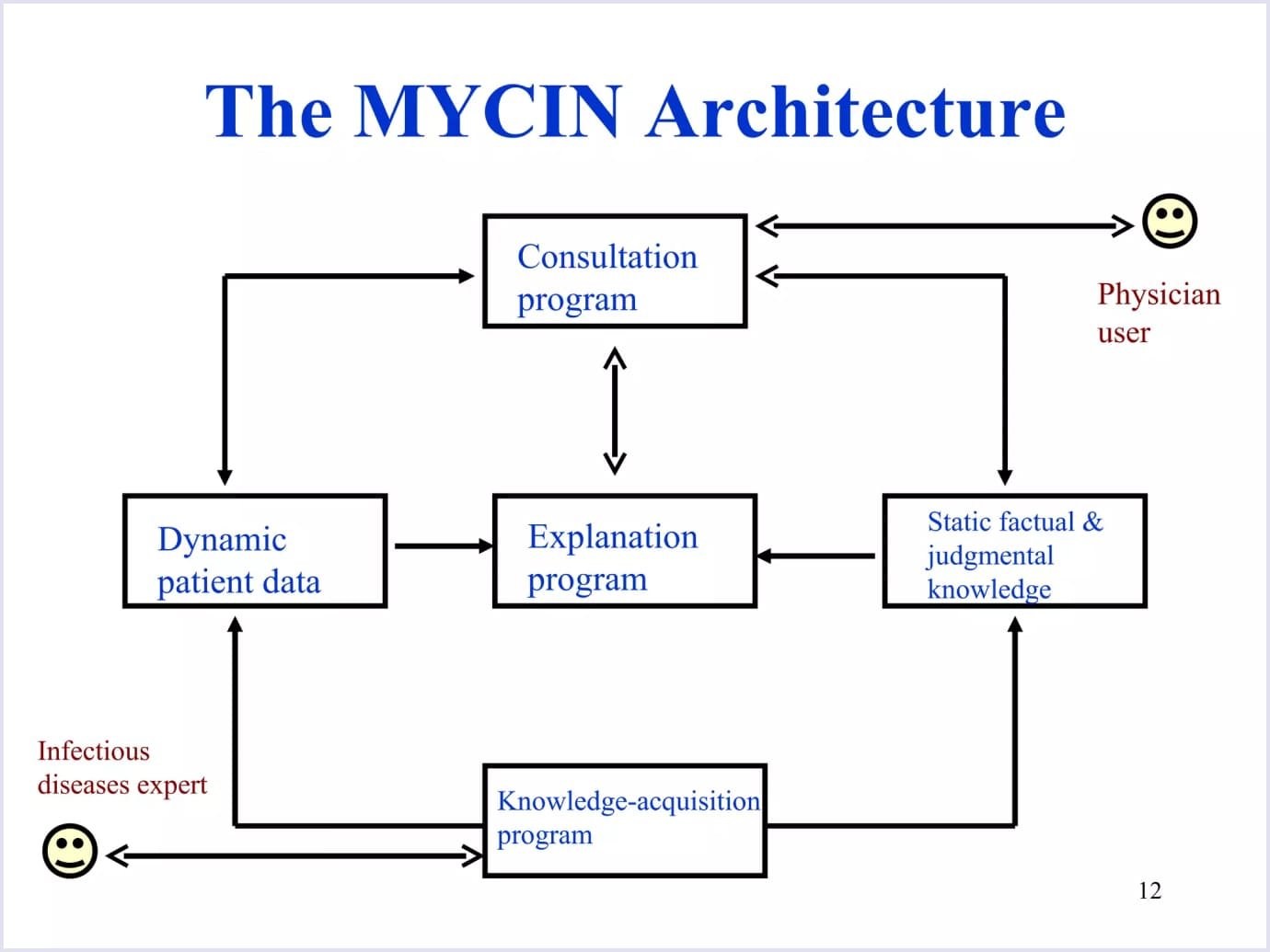
Source: slideshare.net
While AI development achievements became a buzz, they never yielded substantial results. Fortune 500 companies were predicted to use AI, but these predictions ended in the 1980 AI Winter, the period when investments in AI research fell to zero.
Nevertheless, a new breakthrough in AI occurred later in the 1980s. This time, the members of the IBM T.J. Watson Research Center suggested that knowledge acquisition in machines should occur through statistical analysis. This suggestion was opposed to the commonly implemented task-and-action approach to AI and laid the foundation for further AI development.
The next milestone happened in the 1990s-2010s, when machine learning models saw a breakthrough. Thanks to machine learning, AI agents became able to analyze data without explicit programming. Thus, companies introduced them as recommendation systems and natural language processing systems. Amazon, eBay, and Coursera are among such companies.

In recent years, AI agents have developed in many directions. Deep learning and neural networks have leveled up AI agents with new capabilities. These technologies help with image recognition, driving vehicles, and understanding natural language. AI agents’ ability to learn led to numerous improvements in robotics and game playing.
Today, AI agents continue to evolve. Thanks to enhancements in computing, data, and algorithms, AI agents become more advanced and versatile. They bridge networks and platforms, connect and automate IoT, support predictive maintenance, and more.
Types of AI agents
Being designed for different tasks, AI agents have various capabilities and designations. Based on these aspects, we can outline several types of agents in artificial intelligence, which we describe below.
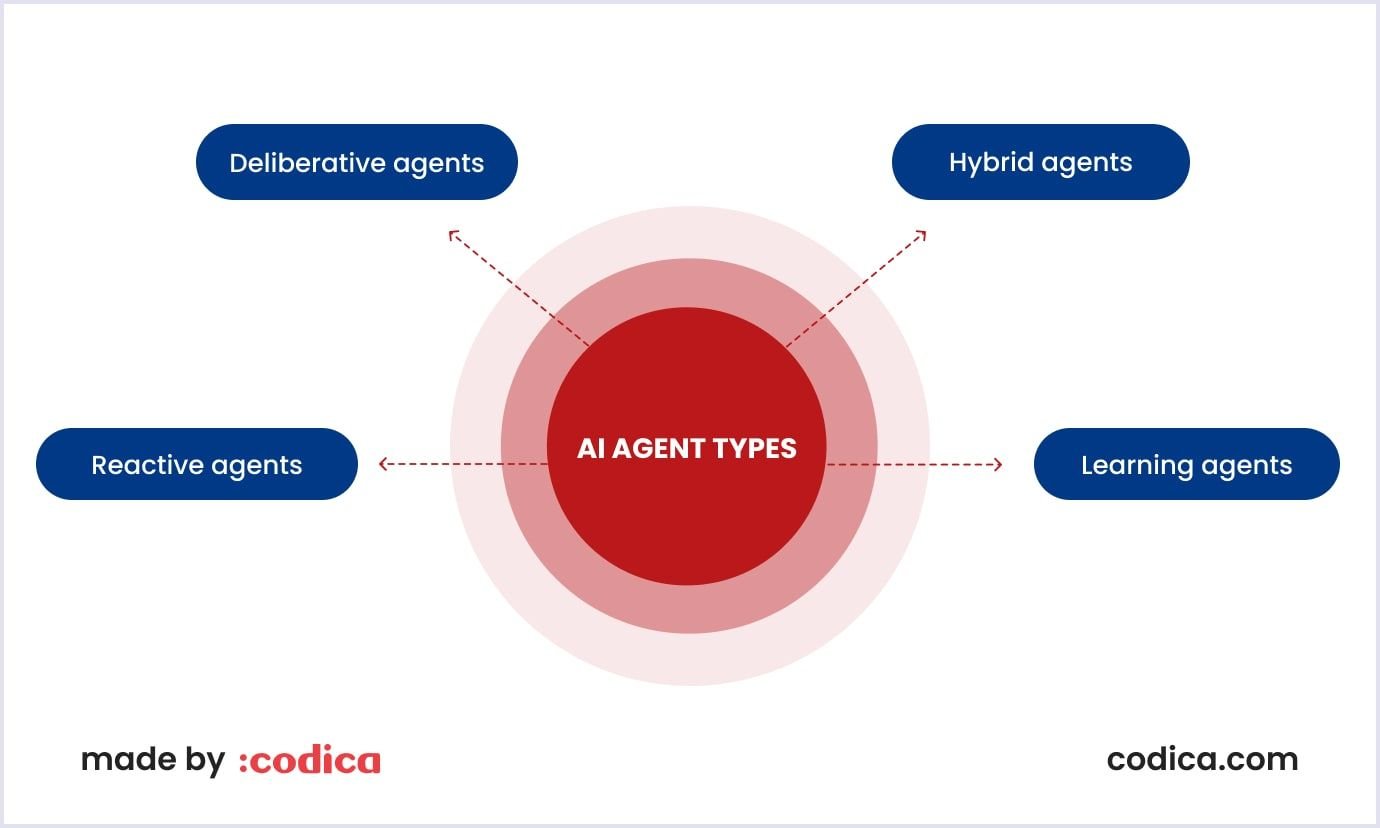
Reactive agents
The reactive agent is the simplest type of such technology. They operate based on mapped input of actions without considering past experiences. This means that such agents act based on pre-programmed reactions to specific events. Reactive agents do not have memory, and they do not learn from their interactions. They are helpful for simple, predictable, and repetitive tasks that need a quick response.
Reactive AI agent examples
Reactive agents are commonly used in games for non-player characters. The agents have simple rules to interact with a player. Also, this type of agent works in basic home automation. They switch the light on when there is movement and switch off when no movement is detected for a while.
Deliberative agents
This type of agents is more advanced than reactive agents. Deliberative agents can reason and plan based on their knowledge and goals. They have a basic understanding of the world and use this model to perform tasks. As deliberative agents can formulate goals, plans, and make decisions, they can act in more complex environments than reactive agents.
Deliberative AI agent examples
We can find deliberative agents in the tasks where decision-making and planning are vital. So, deliberative agents function as robots in manufacturing and exploration missions. For example, IBM Watson can help you spot faults and defects in aircraft thanks to visual recognition technology.
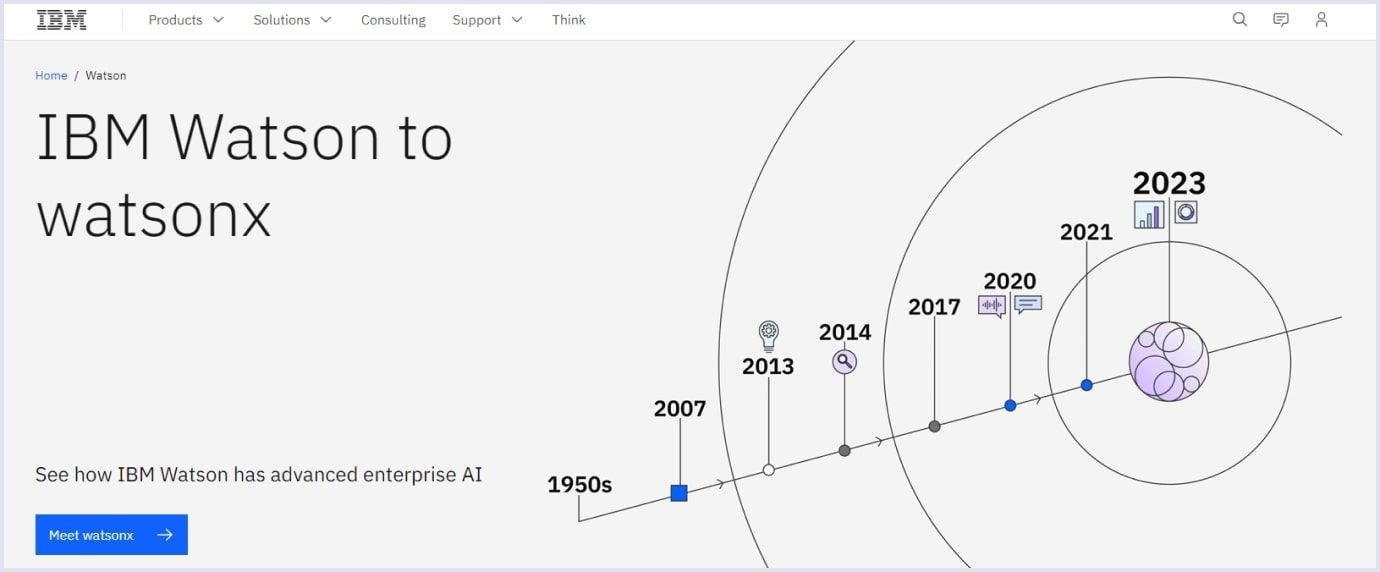
Hybrid agents
Why “hybrid”? That’s because they combine the strengths of reactive and deliberative agents. Where a quick response is needed, hybrid agents use the reactive approach. If you need decision-making based on real-time data, the deliberative side is activated. So, hybrid agents respond to simple situations quickly and can plan and make decisions where the environment changes.
Hybrid AI agent examples
The hybrid intelligent agent examples are self-driving cars and advanced robotic systems. In the case of autonomous cars, the system plans a route and can react to obstacles. Hybrid robotic systems can fulfill tasks on predefined input and adapt to changing environments if needed.
Learning agents
What sets learning agents apart is their ability to process feedback and improve over time. It is possible thanks to four components they have:
- Learning elements to improve the agent’s knowledge and strategies;
- Performance element to use the acquired knowledge for making decisions;
- A critic to evaluate the agent’s actions and provide feedback;
- A problem generator to suggest exploratory actions for discovering new information.
Learning AI agent examples
These technologies are helpful where constant improvement is necessary. You can see them in action on marketplaces and streaming platforms like eBay and Netflix. Learning agents analyze customers’ inputs and suggest the relevant products or shows.
Another application is self-learning chatbots. Thanks to the ability to learn, such chatbots can process customer queries in a meaningful and human-like way.

Benefits of AI agents
Efficiency and productivity
AI agents take up routine tasks and processes and free resources for human work. For instance, AI agents take over data entry, scheduling, and customer service inquiries. Thus complex and creative tasks come to the human team. Such a combination of automated and human-performed processes boosts operations and efficiency.
Moreover, AI agents can handle many processes simultaneously and do not need breaks. For example, chatbots give instant responses and can resolve issues faster than human resources. Thus, constant availability and speed make AI agents a valuable tool to handle many tasks quickly.
Scalability
As a business grows, so can AI agents. If the operation expands, you can deploy more AI agents to manage the expanded load. Thanks to this scalability, AI agents will help you manage operations without the need to hire more staff.
For example, in ecommerce, AI agents process data from millions of customers and provide personalized suggestions to each of them. Also, AI agents can allocate resources in cloud services. This ability ensures that resources are spread evenly and support production during peak times.
Cost reduction
As AI agents help you maintain high productivity and scale operations, they also save you costs. According to McKinsey’s The State of AI in Early 2024, the most cost savings were seen in the compliance domain, IT, service operations, and supply chain and inventory management.
As you may encounter high loads on your ecommerce website or SaaS (software as a service) platform, AI agents take on high loads. Thanks to their ability to process information, they help you with the same workload as with a big team. This means that you save costs for team hiring, training, and infrastructure.
Moreover, AI agents can detect fraud quickly. This feature helps finance websites stay safe, build trust, and avoid costly losses. Also, thanks to such financial protection, marketplaces can ensure safe sales and attract more sellers and buyers.
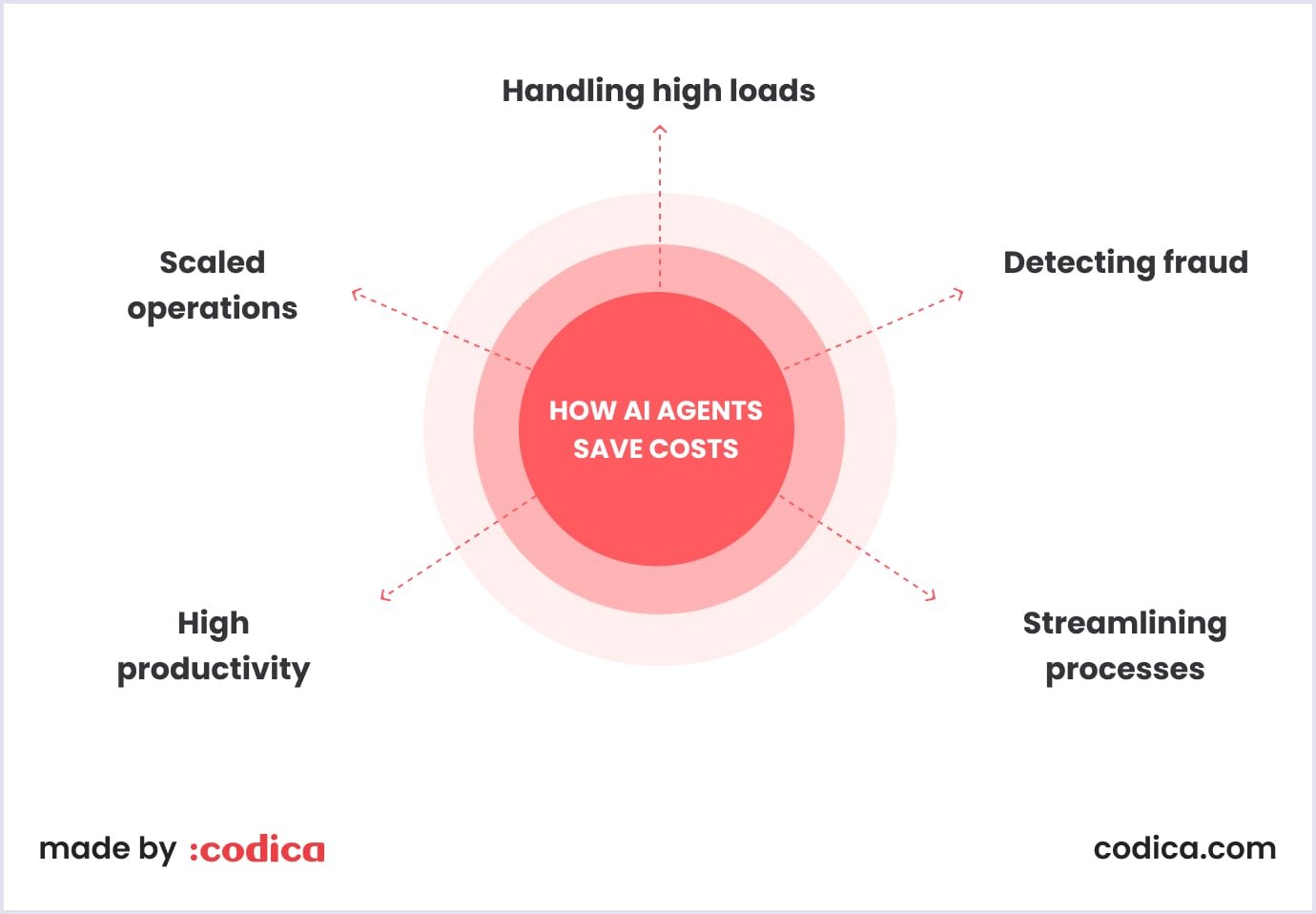
Improved decision-making
Based on data collected by AI agents, your can get insights and make decisions. Thanks to analyzing vast chunks of data, AI agents help you find patterns in user behavior and customize your services. You gain information and predictions on stock flow, customer behavior, and market trends.
For instance, AI agents in marketing help you understand your customers and see where your campaigns perform well. In the supply chain, AI agents help you analyze how the stock will move depending on customer demand. So, businesses know where to make improvements and replenishments. Thus, their operations are stable and can grow over time.
Applications of AI agents
Customer service
AI agents help your customers resolve issues and understand the process on your platform. Thus, your customers get prompt answers to their queries around the clock. Moreover, you can improve your AI agents with natural language processing (NLP). So they will understand complex queries and provide personalized support.
Healthcare
Taking on human workload, AI agent tools in healthcare can help receptionists and assistants focus on more meaningful tasks. With AI agents, patients do not have to wait on hold for 20 minutes just to say they cancel their appointment. So this leads to better service and scheduling experience.
AI agents can speed up issuing repeated prescriptions. They collect the information during the call with the patient and send it to a doctor. The physician checks the correctness of the prescriptions and issues them to the patient. The process is easy and ensures safety as the doctor checks everything. Then, the doctor sends the prescription via the AI agent to the patient.
Check out NVIDIA’s short video on how AI agents can help in healthcare.
Finance
AI agents are highly valuable in financial industry. Since AI can process large chunks of data, it can spot anomalies and potential fraud activities. Customers can also get prompt answers to their inquiries on the accounts, balances, and transactions. What’s more, you can get robohelp that will advise you on promising investments based on your goals and risk tolerance.
Ecommerce
An ecommerce marketplace platform also benefits from AI agents. They power recommendation engines and help customers with finding items. Also, AI agents handle communication on orders, so sellers can streamline their operations. As AI agents can detect fraud, they protect sellers against unlawful activities, making the ecommerce platform trustworthy.
AI agents also help you with inventory management and delivery. So, you or sellers on your platform know what stock they need and what should be handled in the order.
Manufacturing
Streamlining operations in manufacturing is crucial, and AI agents help with critical points in the processes. AI agents can help detect anomalies in production processes and equipment and prevent major failures. They can also schedule production processes and ensure optimized resource usage.
Also, AI agents can inspect products and spot defects based on data from sensors and cameras. By monitoring the production environment, AI agents can detect hazardous conditions and ensure safety in a production environment.

Examples of AI agents in action
Virtual assistants
These tools use NLP and understanding to help with different tasks. AI virtual assistants can manage schedules, answer queries, and provide recommendations. These generative AI agents process massive chunks of data to learn and improve themselves over time.
Let's look at some examples of AI virtual agents. Apple's Siri, Google Assistant, and Amazon's Alexa are the best AI agents that help you perform different tasks. You can control smart home devices and get weather forecasts. Also, virtual assistants enable you to order products online, get cooking recipes, and tackle daily tasks.
Chatbots
These AI agents help users resolve issues. They are typically used in customer service, marketing, and support applications. Chatbots can answer common questions and other queries. Such assistants provide users with the general information they need. These AI agents are often a start for interactions with your platform or customer support.
Chatbots are so common that you know how they work for sure. Still, let’s look at prominent intelligent agents examples. For instance, ChatGPT has become a turning point in how we use AI-powered chatbots. Zendesk Chat is an example of how chatbots serve in customer support and SaaS development services. Meanwhile, Kuki, formerly Mitsuku, an award-winning chatbot, is known for its emotional intelligence and humor.
Autonomous vehicles
You can use AI agents in autonomous vehicles to navigate and operate them without human intervention. These vehicles use a combination of sensors, cameras, and machine-learning algorithms to perceive their environment. So they can make decisions and safely transport passengers or goods.
Among the products that use billions of investments are Tesla’s Robotaxi fleet, Google’s Waymo, Amazon’s Zoox, General Motors’ Cruise, and Mercedes-Benz’s Drive Pilot. These technologies use partial and full autonomy. They help with steering, lane guidance, speed limits, braking, and more.
Autonomous vehicles are a promising technology, but due to current safety problems, fully autonomous vehicles are still a matter of the future.
Robotics
Robotics involves AI agents that control robots to perform tasks in various industries. They include manufacturing, healthcare, and logistics. These robots can be programmed or trained to handle repetitive tasks, dangerous environments, and precision work. Thus, they enhance productivity and safety.
For example, Boston Dynamics’ Spot works in production facilities and makes everyday checks even in the most dangerous conditions. A collaborative robot called Sawyer by Rethink Robotics works alongside humans and helps with manufacturing tasks.
Another example of the best AI agents is Intuitive Surgical’s da Vinci. It is a surgical system that provides precision and control in surgeries beyond human capabilities. Check out an example video showing the human manipulations with this robotic platform.
Codica’s experience with AI agents
Having over 9 years of experience, we rely on proven technologies to implement AI agents. For example, AI development services helped us improve an online recruitment platform. Thanks to the integration of an AI agent, HR specialists can now create job listings quickly and in compliance with the latest standards.
What makes an improved platform stand out is its semantic search. A recruiter can type any modification of a job title, and the system will suggest the correct one. For example, the system will return “Project Manager” if the HR specialist will type “PM.”
Moreover, the platform has a chat where an HR professional can answer questions. This sequence of AI questions and human answers will lead to a compliant job description. It will match current job description standards on the prominent platforms. Below is an example of such a posting.
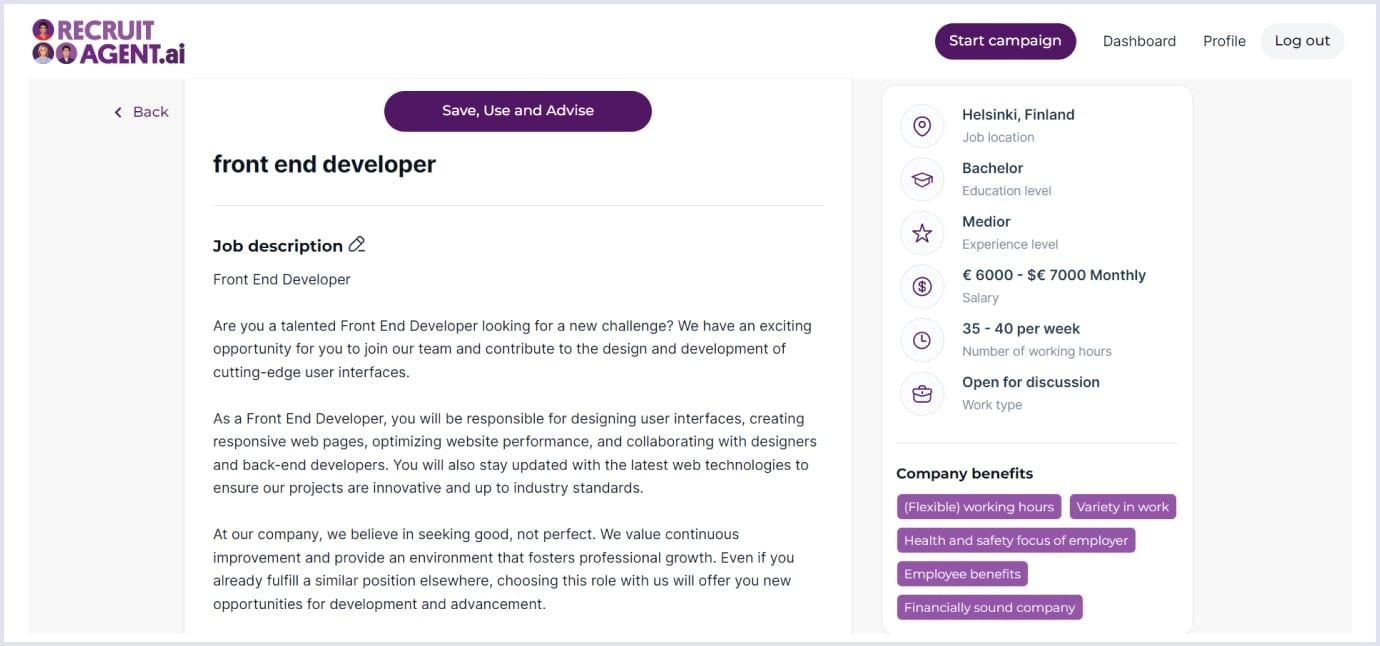
Check out our portfolio for more successful projects that we have delivered to make our customers’ business ideas a reality.
Takeaways
As we can see, AI agents help us in many industries and domains. They take off workloads and give us capabilities that help us reach better standards and services. Thanks to automation, human staff can focus on complex and strategic tasks.
If you have a product that needs improvements or you want to build an AI agent, contact us. Our experts are eager to help you with AI agent implementation for your best business results.
